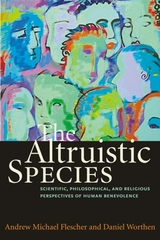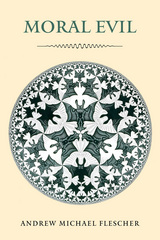
What motivates altruism? How essential is the phenomenon of altruism to the human experience? Is altruism readily accessible to the ordinary person? In The Altruistic Species, Andrew Michael Flescher and Daniel L. Worthen explore these questions through the lenses of four disciplinary perspectives—biology, psychology, philosophy, and religion. In their investigation, they make an extended argument for the existence of altruism against competing theories that construe all ostensible cases of benevolence as self-interest in disguise. The authors consider theories of egoism; the role of genetics and evolutionary biology; the psychological that induce altruistic behavior; philosophical theories of altruism in normative ethics such as Kantian, utilitarian, and Aristotelian models of moral action; and accounts of love of the neighbor in Christianity and Buddhism. Additionally, they offer a new, comprehensive definition of altruism that includes the insights of each of these perspectives.
The Altruistic Species reinvigorates the debate over the prevalence of selfless motivation in human behavior—whether it is a rare or ubiquitous phenomenon—something considered exceptional or a capacity that members of any community could potentially develop. This noteworthy interdisciplinary examination of altruism balances science, virtue theory, and theology. It is ideal for ethics, human behavior, and evolutionary biology courses as an educational resource for other multidisciplinary studies and interested lay readers.

Most of us are content to see ourselves as ordinary people—unique in ways, talented in others, but still among the ranks of ordinary mortals. Andrew Flescher probes our contented state by asking important questions: How should "ordinary" people respond when others need our help, whether the situation is a crisis, or something less? Do we have a responsibility, an obligation, to go that extra mile, to act above and beyond the call of duty? Or should we leave the braver responses to those who are somehow different than we are: better somehow, "heroes," or "saints?"
Traditional approaches to ethics have suggested there is a sharp distinction between ordinary people and those called heroes and saints; between duties and acts of supererogation (going beyond the expected). Flescher seeks to undo these standard dichotomies by looking at the lives and actions of certain historical figures—Holocaust rescuers, Martin Luther King, Jr., Dorothy Day, among others—who appear to be extraordinary but were, in fact, ordinary people. Heroes, Saints, and Ordinary Morality shifts the way we regard ourselves in relationship to those we admire from afar—it asks us not only to admire, but to emulate as well—further, it challenges us to actively seek the acquisition of virtue as seen in the lives of heroes and saints, to learn from them, a dynamic aspect of ethical behavior that goes beyond the mere avoidance of wrongdoing.
Andrew Flescher sets a stage where we need to think and act, calling us to lead lives of self-examination—even if that should sometimes provoke discomfort. He asks that we strive to emulate those we admire and therefore allow ourselves to grow morally, and spiritually. It is then that the individual develops a deeper altruistic sense of self—a state that allows us to respond as the heroes of our own lives, and therefore in the lives of others, when times and circumstance demand that of us.

The idea of moral evil has always held a special place in philosophy and theology because the existence of evil has implications for the dignity of the human and the limits of human action. Andrew Michael Flescher proposes four interpretations of evil, drawing on philosophical and theological sources and using them to trace through history the moral traditions that are associated with them.
The first model, evil as the presence of badness, offers a traditional dualistic model represented by Manicheanism. The second, evil leading to goodness through suffering, presents a theological interpretation known as theodicy. Absence of badness—that is, evil as a social construction—is the third model. The fourth, evil as the absence of goodness, describes when evil exists in lieu of the good—the "privation" thesis staked out nearly two millennia ago by Christian theologian St. Augustine. Flescher extends this fourth model—evil as privation—into a fifth, which incorporates a virtue ethic. Drawing original connections between Augustine and Aristotle, Flescher’s fifth model emphasizes the formation of altruistic habits that can lead us to better moral choices throughout our lives.
Flescher eschews the temptation to think of human agents who commit evil as outside the norm of human experience. Instead, through the honing of moral skills and the practice of attending to the needs of others to a greater degree than we currently do, Flescher offers a plausible and hopeful approach to the reality of moral evil.
READERS
Browse our collection.
PUBLISHERS
See BiblioVault's publisher services.
STUDENT SERVICES
Files for college accessibility offices.
UChicago Accessibility Resources
home | accessibility | search | about | contact us
BiblioVault ® 2001 - 2024
The University of Chicago Press









